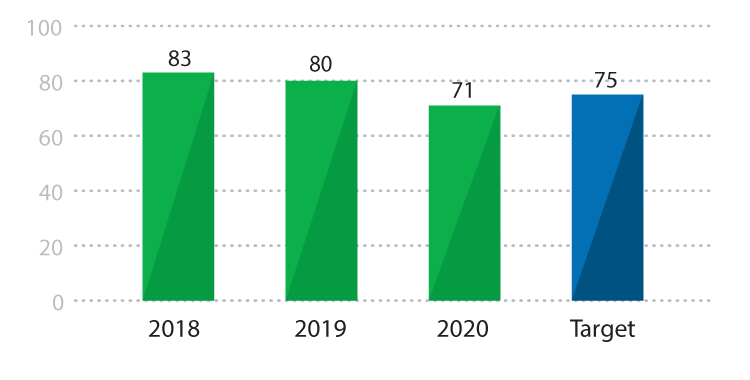3.3.3.6 Skills development
3.3.3.6.1 The Group’s commitment
Skills development is an investment in human capital
2020 marked the roll-out and effective implementation of the new(1) skills development policy signed in 2019. Rolled out in the Group’s companies in France, it specifies and coordinates investment in the changing needs for skills, in line with theCAP 2030 corporate strategic framework.
This policy is designed to boost the transformation of training and professional development practices at a time of rapid changes. It aims to secure the skills needed by the Group’s business lines over the long term, by giving employees an opportunity to develop their employability throughout their careers. It implements a shift from training and employment management to skills management, helping to improve the employability of employees.
Percentage of employees who have taken part in a skills development initiative
This figure has been disrupted this year by the effects of the health crisis. Despite a drop of almost 30% in the number of skills development hours completed this year, the Group maintained access to training and professional development for the vast majority of its employees. In addition, the number of employees who have not taken part in any skills development initiatives over the past three years has also continued to fall by almost 10%, confirming that this access has been maintained overall, despite the context.
Percentage of employees who have taken part in a skills development initiative (%)

2018 : 83
2019 : 80
2020 : 71
Target : 75
Key non-financial performance indicator
The methodology for this indicator is set out in detail in section 3.7.2.2 "Details on performance indicators".
Investment in skills development
Skills development expenditure for the entire Group stood at €484.9 million in 2020 (i.e. €2,935 per employee in the workforce). The particular situation caused by the health crisis had a significant impact, reducing the use of face-to-face training.
2018 | 2019 | 2020 | ||
|---|---|---|---|---|
| Total number of skills development hours | Total number of skills development hours
Number | Total number of skills development hours 2018 7,629,101 | Total number of skills development hours 2019 6,820,423 | Total number of skills development hours 2020 4,735,240 |
| Number of skills development hours per employee in the workforce | Number of skills development hours per employee in the workforce
Number | Number of skills development hours per employee in the workforce 2018 47 | Number of skills development hours per employee in the workforce 2019 41 | Number of skills development hours per employee in the workforce 2020 29 |
| Number of employees who have taken part in a skills development initiative | Number of employees who have taken part in a skills development initiative
Number | Number of employees who have taken part in a skills development initiative 2018 138,131 | Number of employees who have taken part in a skills development initiative 2019 131,992 | Number of employees who have taken part in a skills development initiative 2020 117,341 |
| Number of employees who have not taken part in a skills development initiative for 3 or more years | Number of employees who have not taken part in a skills development initiative for 3 or more years
Number | Number of employees who have not taken part in a skills development initiative for 3 or more years 2018 6,023 | Number of employees who have not taken part in a skills development initiative for 3 or more years 2019 6,527 | Number of employees who have not taken part in a skills development initiative for 3 or more years 2020 5,907 |
A rapid adaptation to the constraints generated by the health crisis was made possible through the efforts(2) of the Group’s training staff, shared guidelines and the involvement of external providers. The proportion of remote learning rose sharply to reach 22% of all skill development hours in 2020.
Re-engineering, digitalisation and adaptation of courses
2020 was marked by major overhauls of training systems, such as:
- the redesign of major courses and strategic courses within the production field, such as “nuclear culture”, thanks to a hackathon of re-engineering;
- the training of work-study tutors, transformed in less than a week.
New direction and shift in practices
The implementation of the new policy also accelerated the work to establish the conditions for a “learning organisation”, through diagnostic tools and a more precise use of data from training evaluations. In addition, the use of Work-Based Training Initiatives (action de formation en situation de travail or AFEST) as a practice for employee professional development, as part of daily production operations, aims to consolidate the skills and knowledge acquired. A Knowledge Management approach has been structured for a rapid roll-out within the nuclear industry.
3.3.3.6.2 Employees actively involved in their career
The aim is to implement a shift from training and employment management to skills management.
- the improvement of the employee “user path” continues. By streamlining the catalogue range by 37% over the last two years, EDF has continued its efforts to improve the accessibility and intelligibility of the available training. The first steps have been taken for a marketing of the range, through the new training module of the “MyHR” HR IS, and this approach allows the expressed needs to be matched with the corresponding available training;
- the accessibility of the training has also been enhanced by the roll-out of a range of remote training courses, in particular in cross-disciplinary skills (languages, office automation, quality of written documents, oral communication, professional posture, personal development and quality) through special digital platforms. They are gradually being rolled out to cover most of the themes offered and are intended for all business lines and subsidiaries;
- lastly, the internal “ecampus” platform continues to be developed (and via this platform, access to special digital training from partners). 96,600 employees use de-campus for training in 2020 and 40,000 Group employees attended the three corporate campuses (Saclay, Lyon and Chatou).
(1) This affects subsidiaries whose registered office is in France, employing more than 50 employees.
(2) Common base of instructions, processes and operating procedures.
